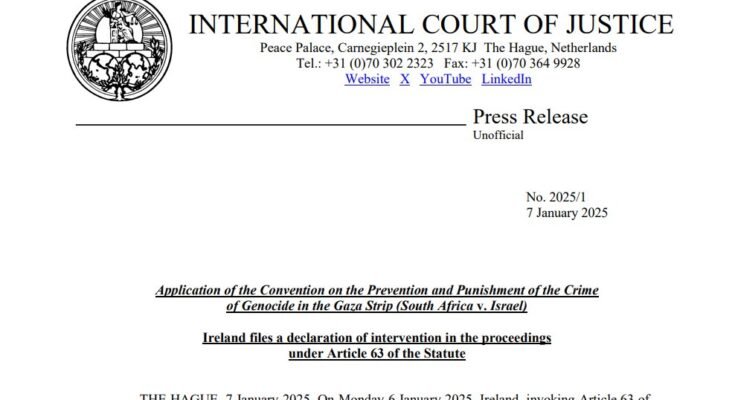Ireland has formally invoked Article 63 of the International Court of Justice Statute in an unprecedented move to intervene in the case of South Africa v. Israel currently before the ICJ. This case represents claims of genocide in Gaza a crisis for which condemnation and demands for accountability have been raised worldwide. The declaration of intervention by Ireland means it is standing for international law and human rights, placing itself as a vocal advocate for justice in one of the most contentious geopolitical conflicts of our time.
The case was brought by South Africa against Israel, under allegations of acts of genocide against Palestinians in Gaza. The term “genocide” is weighted under international law, defined by the 1948 Genocide Convention as acts committed with intent to destroy, in whole or in part, a national, ethnic, racial, or religious group. The conflict in Gaza has been marked by widespread destruction, civilian casualties, and alleged violations of humanitarian law, and it’s against this backdrop that South Africa issued its legal challenge.
The interesting thing is the intervention by Ireland under Article 63. A party to a treaty which is being interpreted by the ICJ can intervene in cases before the court if they feel that their interest in the matter at issue is affected. In invoking this article, Ireland intends to show its interest in the faithful adherence to and responsibility of the principles of the said Convention.
Ireland has traditionally been a bastion of human rights and international justice. A member of the European Union and one of the staunch supporters of multilateral diplomacy, Ireland has often given voice to the downtrodden and spoken on behalf of international law. In this case, too, Ireland’s intervention befits its greater foreign policy imperatives, which have time and again placed human rights and the rule of law as a priority.
Irish Foreign Minister Micheál Martin said during a recent press briefing, “Our intervention reflects Ireland’s steadfast commitment to the principles enshrined in the Genocide Convention. We believe it is our moral and legal obligation to ensure that such grave allegations are thoroughly examined and addressed by the international community.”
Ireland’s intervention is of larger legal and political consequence. This reiterates the universality of the Genocide Convention and the duty of all signatories when serious violations are alleged. One possible implication of this is that it might set a precedent for other states, perhaps even an enlarged coalition that would press for justice in Gaza.
Secondly, Ireland’s involvement lends further weight to the proceedings. As a neutral actor without any direct stake in the Israel-Palestine conflict, its intervention is more likely to be viewed as an expression of principled concern rather than political bias. This could strengthen the credibility of the case and demands for accountability.
Thirdly, the move by Ireland underlines how smaller nations are shaping the global human rights agenda. While big powers often dominate international discourse, Ireland’s move underlines the fact that small states can also pull punches by sticking to their principles and using international legal mechanisms.
The reaction to Ireland’s intervention has been mixed. Human rights organizations and Palestinian advocacy groups have hailed the move, saying Ireland is acting bravely on behalf of international law. Amnesty International welcomed Ireland’s commitment to justice by calling for states to support the proceedings before the ICJ.
However, Israel and its allies have criticized Ireland’s intervention as uncalled for interference in a complex political dispute. The Israeli government has always denied allegations of genocide on grounds that its military actions in Gaza are needed for self-defense against Hamas.
The United States has also come on record regarding its reservation over the case filed at ICJ against its close ally. The spokesperson reiterated the position: “legal actions should not detract from efforts to achieve a two-state solution and lasting peace between Israelis and Palestinians.”
The intervention by Ireland will add a new dimension to the proceedings as the ICJ considers the merits of the case. Intervening, Ireland will be afforded an opportunity to argue and contribute to the interpretation of the Genocide Convention in the context of the Gaza conflict, which may have far-reaching implications for the development of international law and accountability of states accused of grave violations.
This case also underpins the role of international multilateral institutions, such as the ICJ, to deal with global crises. However obvious it may seem, political negotiations are the only way to resolve the conflict between Israel and Palestine. The legal mechanisms establish an important route to pursue very serious human rights violations and, correspondingly, ensure accountability.
Ireland’s intervention in South Africa v. Israel sends an important message regarding Ireland’s commitment to justice and human rights. In a world where international law is usually challenged, Ireland’s principled stance serves to remind one of how important it is to uphold the rules-based international order. As the case unfolds, eyes will be hooked on the ICJ, expecting a verdict that reflects both the gravity of the allegations and the need for accountability in one of our time’s longest-running conflicts.



